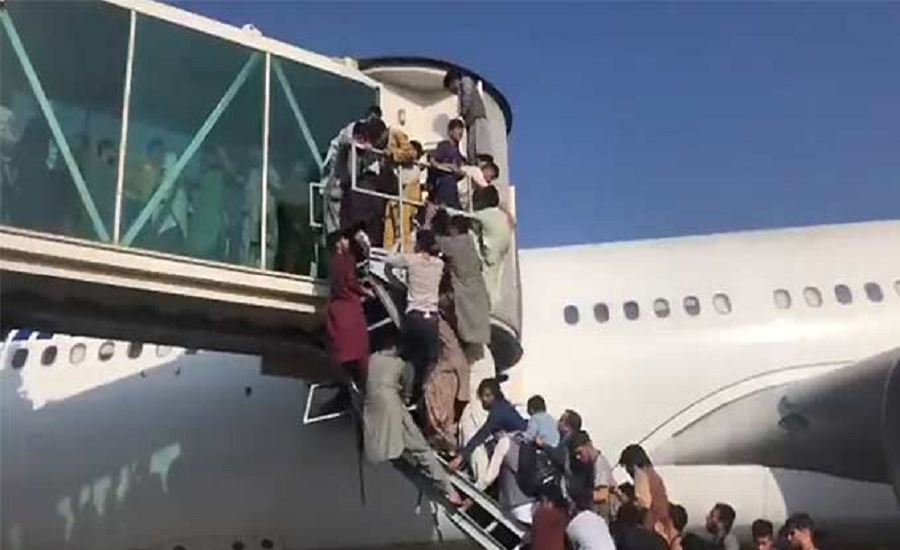
The idea of liberalisation as taught by the West is not and should not be treated as biblical or universal
Arshia Sana| Clarion India
AS US started withdrawing its troops from Afghanistan late June this year, leaving the country in an eerie, Taliban headed up stronger than before. Taking over the country, city after city, Taliban has claimed absolute authority after it claimed the Panjshir Valley, a part of Afghanistan with the most resistance force. Not only does it open an international discourse on law, economy and international relations, it has puzzled its citizens with a state of uncertainty of future.
Can we ever forget those videos showing trepidation at the Kabul airport where people were seen climbing up each other to board the USC 130 Hercules aircraft and dropping to death after it took off? Answer seems ‘No’, just like the picture of the three-year old Syrian boy whose body was washed ashore haunts us even after six years of the incident.
The loss of US in this two-decade-long US-Afghan war has resulted in a ‘Kobayashi Maru’ situation for the West. However, US has been reluctant to admit its loss on the international front and the international media has largely covered it by using the word ‘withdrawal’ instead of ‘loss’. Ever since the US started ‘withdrawing’ from Afghanistan, countries around the globe started evacuating their citizens from the war-ravaged country. The US evacuation was soon followed by countries like Canada, Britain, Germany, France, India, Turkey and Sweden among others. While people were scrambling to gush out of country, Taliban ensured safe passage to all evacuees as we saw in several graphics across social media.
But what’s striking is the Afghans reaction of Taliban takeover of the country. While there have been reports of fear amongst the citizens, one cannot and should not ignore the fact that there has not been a single casualty caused by Talibs post-independence, that the Taliban came to power without a bullet being shot, without a life being compromised. Though Afghans fear of staying back in the Taliban is derived from the Taliban’s shady image of the past, thousands of people are trying to escape the country while millions decided to stay back.
The recent attacks at Kabul airport which killed at least 175 people including 28 Taliban men and 13 US troops, as backed by ISIL-K- a terror organisation suggest that the Taliban is not only alien of but also in opposition with the group. Their intention was to target the US and embarrass the Taliban – killing two birds with one stone and disrupting the flow of restoration and provoking other resistance and terror forces within the country.
On the contrary, the Taliban seemed to have taken a liberal turn this time as its spokesperson, Zabihullah Mujahid promised women’s right to education and work within the limits of Shariah, which is very much under scrutiny for implementation. To some political and legal analysts, this caveat ‘within the limits of Sharia’ is a point of contention, however it should not be. The world has always known Afghanistan as a theocratic State with little heed to democratic system, preferring Sharia’ especially in the matters of international and criminal disputes.
Article 3 of the 2004 Constitution of Afghanistan itself contains a repugnancy clause stating that “no law may be repugnant to the beliefs and ordinances of the sacred religion of Islam.” While establishing Islam as the sacred religion of the State of Afghanistan, Article 2 of the Constitution guarantees freedom of religion to the followers of other religions to freely exercise their faith and perform religious rites within the limits of the law.
Howbeit, there has been persistent coexistence and competition between sharia and customary law. What Sharia’ upholds in Afghanistan, customary law refutes. While Islamic law, also known as the Hanafi school of law, substantially controls matters of personal relationship and most aspects of inheritance, local custom prevails on grassroot levels in case of a conflict. In criminal matters, nevertheless, both sources of law can govern the case. This friction between the two sources of law not only exacerbates the legal situation of the country but also leaves the society in a ceaseless farce on the face of development.
Having said that, one cannot deny the fact that the US mission of turning Afghanistan into “US occupied Afghanistan” or liberalising (Westernising) a conservative society did not go much as planned. In fact, the data tells us otherwise. There have been aggravating human rights abuses and war crimes in the past two decades than it happened in Taliban ruled Afghanistan. A ground-report by Afghan Independent Human Rights Commission (AIHRC), a Commission set in consonance with the United Nations, stated that the alarming security situation was still the most significant challenge in Afghanistan.
Despite Western strategies and policies for improving the socio-economic situation of Afghans, many still suffered with extreme poverty, systemic discrimination, and a lack of adequate health care, education and shelter. Not only did the past human rights abuses remained unpunished, abuses like mass murders, rapes and revenge killing continued to grow under the garb of liberalisation. The US, in its thirst of liberalisation (colonisation), failed to realise that any reform to a legal system requires as an essential prerequisite the existence of a stable, functioning, and capable state, both able and willing to enforce laws which unfortunately was not the condition in Afghanistan. If only US could learn from its experiences in Vietnam and Iraq, had there been lesser war crimes and human rights abuses.
That brings me to an interesting conjuncture that howsoever upset President Biden is with the Taliban’s takeover, the very idea of the Taliban defeating the Western ideology induced a feeling of glee in the US far-right. Their admiration of Taliban which comes for the presupposition that an overtly illiberal native group outfoxed the intellectual and heavily advanced war machine of America by enfeebling the US-backed Afghan government is unhidden from the world. They rejoice over the fact that the two decades of persistent efforts of democratising a nation surrendered to a tribal resistance force within the country.
An Israeli writer, Yoram Hazony who is quite vocal of ‘national conservatism’ tweeted, “What went wrong in Iraq and Afghanistan was, first and foremost, the ideas in the heads of the people running the show, Say its name: Liberalism”. Such an admiration and inspiration of white supremacists who interpret the Taliban’s victory as “a lesson in love for the homeland, for freedom, and for religion,” bypassing their anti-Muslim bigotry is a hint of menace for internal conflict in America, especially in the aftermath of BLM.
To conclude, it is too early to pass a judgment for a country who just gained independence from foreign forces and is starting with the restoration. To govern a war-torn country is neither easy nor easily accepted. Haven’t we read enough about the post-independence history of India? The challenges that India went through and the plight of partition that haunts the Indian subcontinent even after seventy-five years of independence.
The world has always kept a sceptic eye and critical voice against such a country, especially when it comes to Eastern world. Challenges like war-torn economy, acute hunger and extreme unemployment continue to linger upon the newly formed administration amidst the fulfilment of promises of women’s rights to education and work. In addition, the sanctions and budget cuts by the IMF will only intensify the perils of Afghans than taking much from the Taliban.
Points to take home is, liberalism and development is to improve the quality of life and not impede the quality of life. The idea of liberalisation as taught by the West is not and should not be treated as biblical or universal. Instead, every legal system is unique in its own sense and universalizing the Western idea of liberalization may cause more harm than good and lead to unrelenting bleakness.
_____________
 Arshia Sana is Assistant Lecturer of Law at Jindal Global Law School, O.P. Jindal Global University
Arshia Sana is Assistant Lecturer of Law at Jindal Global Law School, O.P. Jindal Global University

